For the 2025 school year, there is 1 public preschool serving 383 students in Louisville Municipal School District.
Public Preschools in Louisville Municipal School District have a diversity score of 0.29, which is less than the Mississippi public preschool average of 0.60.
Minority enrollment is 90% of the student body (majority Black), which is more than the Mississippi public preschool average of 55% (majority Black).
Overview
This School District
This State (MS)
# Schools
7 Schools
282 Schools
# Students
2,490 Students
125,600 Students
# Teachers
201 Teachers
10,006 Teachers
Student : Teacher Ratio
13:1
13:1
District Rank
Louisville Municipal School District, which is ranked within the top 50% of all 148 school districts in Mississippi (based off of combined math and reading proficiency testing data) for the 2021-2022 school year.
The school district's graduation rate of 88% has increased from 80-84% over five school years.
Overall District Rank
#71 out of 148 school districts
(Top 50%)
(Top 50%)
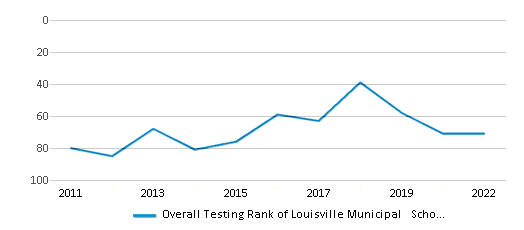
Math Test Scores (% Proficient)
44%
47%
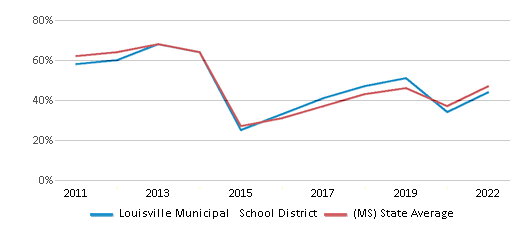
Reading/Language Arts Test Scores (% Proficient)
33%
42%
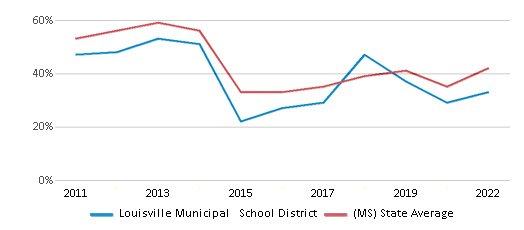
Science Test Scores (% Proficient)
44%
55%
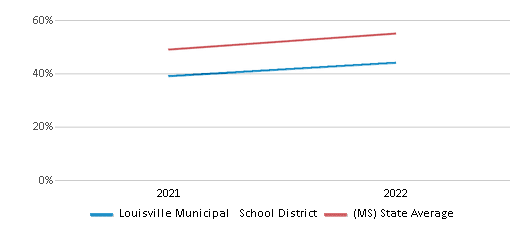
Graduation Rate
88%
89%
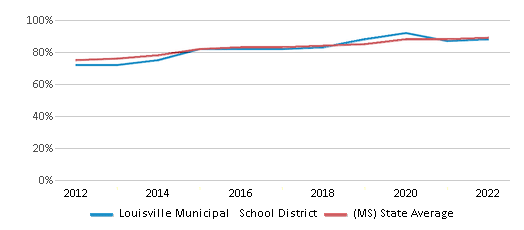
Students by Ethnicity:
Diversity Score
0.51
0.60
# American Indian Students
22 Students
282 Students
% American Indian Students
1%
n/a
# Asian Students
9 Students
834 Students
% Asian Students
n/a
1%
# Hispanic Students
37 Students
5,432 Students
% Hispanic Students
2%
4%
# Black Students
1,558 Students
56,691 Students
% Black Students
63%
45%
# White Students
778 Students
55,982 Students
% White Students
31%
45%
# Hawaiian Students
n/a
66 Students
% Hawaiian Students
n/a
n/a
# Two or more races Students
86 Students
6,313 Students
% of Two or more races Students
3%
5%
Students by Grade:
# Students in PK Grade:
40
9,221
# Students in K Grade:
195
22,360
# Students in 1st Grade:
173
22,172
# Students in 2nd Grade:
217
19,400
# Students in 3rd Grade:
157
14,702
# Students in 4th Grade:
154
13,066
# Students in 5th Grade:
148
10,676
# Students in 6th Grade:
195
4,243
# Students in 7th Grade:
180
1,742
# Students in 8th Grade:
207
1,709
# Students in 9th Grade:
221
1,025
# Students in 10th Grade:
204
986
# Students in 11th Grade:
192
953
# Students in 12th Grade:
162
827
# Ungraded Students:
45
2,518
District Revenue and Spending
The revenue/student of $12,255 is higher than the state median of $12,205. The school district revenue/student has grown by 6% over four school years.
The school district's spending/student of $11,444 is less than the state median of $12,074. The school district spending/student has grown by 6% over four school years.
Total Revenue
$31 MM
$5,371 MM
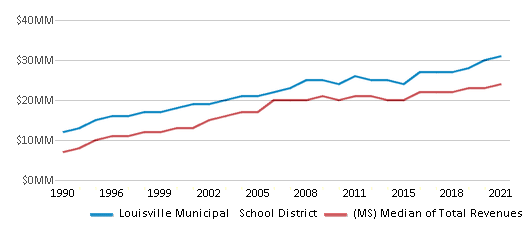
Spending
$29 MM
$5,314 MM
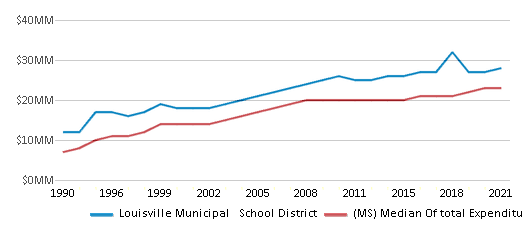
Revenue / Student
$12,255
$12,205
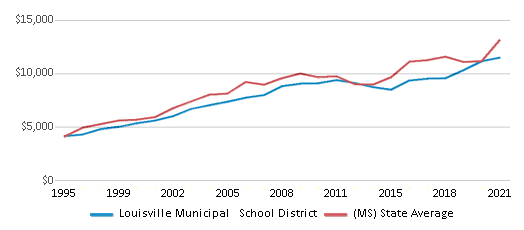
Spending / Student
$11,444
$12,074
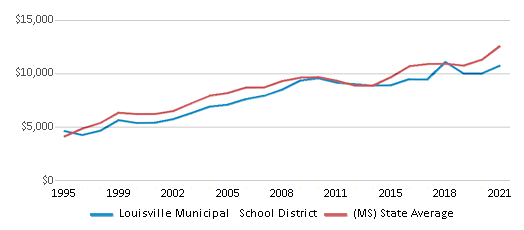
Best Louisville Municipal School District Public Preschools (2025)
School
(Math and Reading Proficiency)
(Math and Reading Proficiency)
Location
Grades
Students
Rank: #11.
Fair Elementary School
(Math: 80-84% | Reading: 55-59% )
Rank:
Rank:
7/
Top 50%10
177 N Columbus Avenue
Louisville, MS 39339
(662) 773-5946
Louisville, MS 39339
(662) 773-5946
Grades: PK-2
| 383 students
Recent Articles

What Is A Charter School?
Explore the world of charter schools in this comprehensive guide. Learn about their history, how they operate, and the pros and cons of this educational innovation. Discover key facts about charter schools, including admission policies, demographics, and funding, as well as what to look for when considering a charter school for your child.

10 Reasons Why High School Sports Benefit Students
Discover the 10 compelling reasons why high school sports are beneficial for students. This comprehensive article explores how athletics enhance academic performance, foster personal growth, and develop crucial life skills. From improved fitness and time management to leadership development and community representation, learn why participating in high school sports can be a game-changer for students' overall success and well-being.

February 05, 2025
Understanding the U.S. Department of Education: Structure, Impact, and EvolutionWe explore how the Department of Education shapes American education, from its cabinet-level leadership to its impact on millions of students, written for general audiences seeking clarity on this vital institution.





